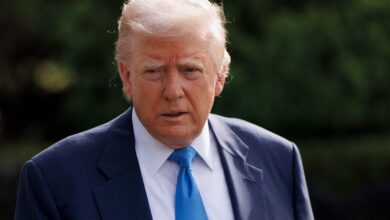Asian stock markets plunge, U.S. futures tumble as tariff turmoil continues

The global financial markets were hit hard on Monday as U.S. stock futures faced renewed selling pressure following a tumultuous week. Leading indexes around the world plummeted last week amidst growing concerns over the economic repercussions of the Trump administration’s latest tariff actions.
In early trading on Monday, Tokyo’s Nikkei 225 index saw a sharp decline of 7.8%, while shares in Hong Kong experienced their worst day in over 16 years with a plunge of more than 12%. The Shanghai Composite Index in mainland China dropped by 8.4%, the Taiex in Taiwan fell by 9.7%, and South Korea’s Kospi lost 5.6%. Australia’s benchmark stock index also closed 4.2% lower after briefly recovering from a loss of over 6%.
Dow Jones Industrial Average futures were down by 1,573 points, Nasdaq futures saw a decrease of 992 points, and S&P 500 futures lost 251 points as of early Monday morning. The global markets had been on edge since President Trump announced a minimum 10% tariff on all U.S. imports and reciprocal levies on nearly 90 countries. The global tariff took effect over the weekend, with matching tariffs set to kick in on April 9.
The unexpected scale of the tariffs rattled investors, leading to the sharpest decline in U.S. stocks in five years and wiping out trillions in investor wealth. Economists warn that imposing broad tariffs on imported goods could lead to increased inflation, reduced consumer spending, and hindered economic growth. In response to the U.S. tariffs, China announced a 34% tariff on all U.S. products starting April 10, adding to the escalating trade tensions between the two economic powerhouses.
Since returning to the White House in January, President Trump has implemented a series of tariffs on various countries, raising the average U.S. tariff rate on imported goods to its highest level since 1909. Despite mounting pressure and market volatility, Trump has remained steadfast in his tariff policies, stating that he will not back down unless other nations address trade imbalances with the U.S.
While some Wall Street economists anticipate potential negotiations and tariff easing in the coming months, there is a looming risk of escalating trade disputes and retaliatory measures from trading partners. The uncertainty surrounding global trade policies has cast a shadow over financial markets, with analysts cautioning against further tariff escalations and punitive actions.
In conclusion, the global financial landscape remains turbulent as investors grapple with the implications of escalating trade tensions and tariff wars. The unpredictability of trade policies and the potential for further market volatility underscore the need for cautious optimism and strategic decision-making in the face of economic uncertainty.





